Iranian Activist Condemns Her ‘Absurd’ Prison Sentence Over Hijab
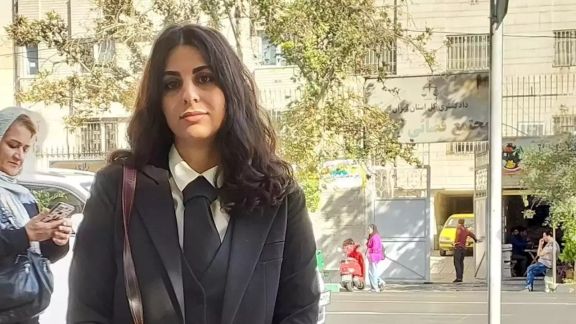
Iranian civil activist Sepideh Rashno has condemned as “absurd” the four-year prison sentence she is facing over hijab defiance.

Iranian civil activist Sepideh Rashno has condemned as “absurd” the four-year prison sentence she is facing over hijab defiance.
Rashno’s outspoken response comes after the regime sentenced her on several charges.
In a post on her Instagram account on Tuesday, she said, "Four years of imprisonment for having hair is just as absurd as if someone were imprisoned for having hands or feet."
Rashno added in a defiant statement targeted at the Iranian regime: "Don't be happy either. Four years of captivity cannot create a change in reality. You are defeated by [people’s] awareness."
Rashno was arrested on July 16, 2022, after a video went viral of a woman haranguing her for failing to wear a veil on public transport. Rashno was later tortured into a televised apology for her actions and for the confrontation. In the “confession” video, there were bruises on her face suggesting she had been tortured. Rashno was released from Tehran’s Evin prison after about 40 days on bail of about $27,000, a huge sum for ordinary Iranians.
She has been found guilty of "association and collusion with the intent of endangering national security" and "propaganda against the Islamic Republic".
She now faces a sentence of 3 years and 11 months.
On Tuesday, Milad Panahipour, Rashno's lawyer, announced the initiation of a third case for his client, revealing that the appeals court had sentenced her to 4 months of definite imprisonment on charges of “publishing obscene images on social media.”
Rashno gained renewed attention last month when a photo circulated online of her meeting with protest rapper Toomaj Salehi after his release from jail having been accused of “spreading propaganda”’.
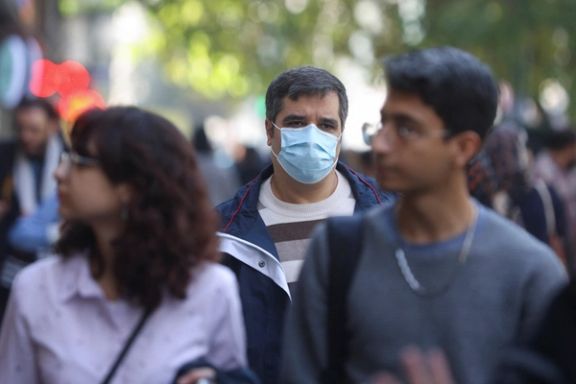
Authorities in Iran’s religious city of Mashhad have resorted to displaying their facial recognition capabilities as a measure to frighten women into wearing the hijab.
Vahid Tafrihi, the social editor of Khorasan newspaper in Mashhad, was the first to bring the controversial move to public attention in an Instagram post on Monday. His post included a photo of one of the monitors that displays photos of several subway passengers taken from CCTV footage along with their age and gender.
“This is the Shariati Station of Line One of Mashhad Metro. The photo of all people who pass by CCTV cameras is shown together with age and gender information on large monitors. Can the municipality explain what it is seeking to achieve by this?” Tafrihi, whose newspaper is owned by the religious shrine in the city, asked.
Astan-e Qods-e Razavi is a massive state body under Supreme Leader Ali Khamenei’s control which manages the shrine of the 8th imam of Shiites in Mashhad and its vast economic empire.
The Instagram post appears to have been removed from Tafrihi’s account, but a screenshot of the post is being widely circulated on social media. Arash Hashemi, another journalist from Mashhad, said in a tweet Tuesday evening that the monitors seem to have stopped showing passengers’ images and information for the time being.

The age and gender info displayed on monitors was apparently obtained from the identity documents linked to passengers’ travel payment cards.
Social media users say similar monitors that were first installed at Mashhad railway station around six months ago were employed at the city’s subway stations and airport a month ago.
Many social media users have interpreted the move, which they say reminds them of a society like the one described in George Orwell’s novel 1984, as the authorities’ attempt to show off the facial recognition capabilities at their disposal to intimidate women who refuse to abide by the mandatory hijab.
Mashhad, the hometown of President Ebrahim Raisi, is Iran's second-largest city with a population of over three million, and one of the bastions of Iran's hardliners.
“Disclosure of individuals’ personal information [such as age] is a crime and is punishable by law,” Keyvan Saedy, a conservative politician and former lawmaker, tweeted Tuesday.
“Mashhad subway’s disclosure of passengers’ personal information is an obvious violation of citizenship rights, causes loss of security and psychological peace, and destroys the ruling systems’ image. It indicates misunderstanding and insult to Islam even if it done for [enforcing] the religious duty of hijab,” he wrote and demanded serious action to be taken against those behind the move.
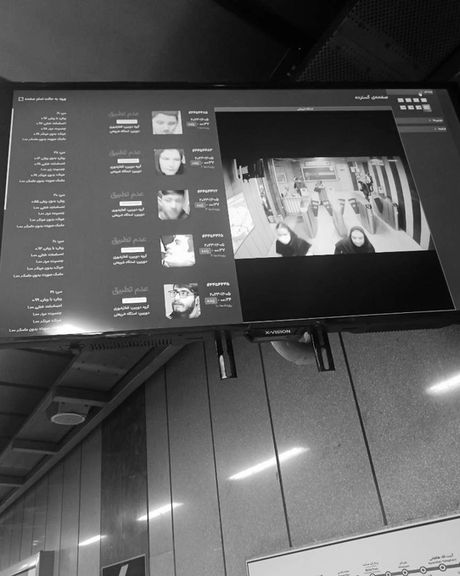
Speaking to Faraz Daily, an online news website, Tuesday evening, a Mashhad city council member claimed that the municipality was not responsible for the installation of CCTV cameras and monitors.
“We don’t know who is controlling them,” Hasan Mansourian told Faraz Daily, adding that the cameras that make it possible to display information on the person whose image is shown on the monitor must be somehow connected to a central server such as the state registration organization which issues national IDs and operate with artificial intelligence.
He also said the cameras are going to be turned off “until permits are issued” and the public is informed about the plan.
In late November, authorities similarly refused to take responsibility for the deployment of hijab enforcers at the capital Tehran’s subway stations which were quickly dubbed as “tunnels of horror” by opposition media and social media users.
Authorities claimed the black-veiled women who lined-up the subway corridors to inspect passengers’ hijab abidance, and the cameramen who filmed the passengers as they passed, were “citizens’ groups” carrying out the religious duty of enforcing hijab for which everyone is responsible.
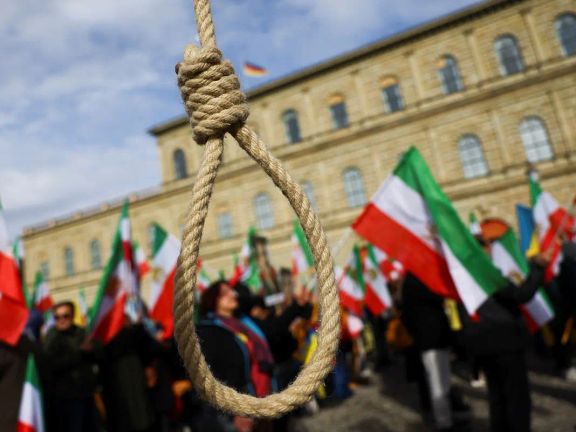
Five prominent French labor unions have condemned the increasing wave of executions in Iran.
In a joint declaration released on Monday, the French Democratic Confederation of Labor (CFDT), General Confederation of Labor (CGT), Unitary Trade Union Federation (FSU), Solidarity trade union, and National Union of Autonomous Trade Unions (UNSA) accused the Iranian government of exploiting global attention on the ongoing conflict in Gaza to intensify its oppressive measures.
The declaration highlighted Iran's response to growing social and popular anger, particularly related to the economic crisis, by escalating repression. This comes amidst authorities increasing arrests of worker activists under false pretexts and targeting individuals who have organized peaceful demonstrations against the high cost of living and salary arrears.
The syndicates emphasized that repression extends beyond worker activists, impacting those expressing opinions contrary to the regime's beliefs, including lawyers, women's rights advocates, and human rights defenders.
Underlining the disproportionate impact on women who have come under increasing pressures to abide by mandatory dress codes and have witnessed state-sanctioned sexual violence in detentions as documented by Iran's Me Too movement, they stated, "Women are the first victims of the authoritarian and patriarchal regime."
The government's heightened execution rates, particularly public ones, were slammed as an attempt to instill fear in the population, putting to death at least 419 people in the first seven months of the year, a rise of 30% since the same period last year, according to the UN.
In a call for international solidarity, they urged all organizations and individuals defending human and workers' rights to protest against the Iranian authorities. Their demands include the abolition of the death penalty, annulment of unjust convictions contrary to fundamental freedoms, and the immediate and unconditional release of activists imprisoned for their opinions or union and association activities, as well as foreign citizens.

The Baha'i International Community (BIC) has issued a statement accusing Iran of employing brutal tactics to persecute the country's Baha'i religious minority.
Released on Monday, the statement sheds light on the government's systematic efforts to strip Baha'is of their "sense of peace and security in their daily lives."
The disturbing methods employed by authorities include violent home raids, a surge in Baha'is in prison and awaiting summons, punitive property confiscations, denial of burial rights, obstruction of higher education, and a surge in official hate speech against the community.
Simin Fahandej, BIC Representative to the United Nations in Geneva, expressed deep concern, stating, "The growing volume of attacks on Iran’s Baha’is, which we have observed for over a year, is exceeded only by the brutality of the new tactics that the Iranian government is bringing to bear against the innocent Baha’i community."
The statement outlines a strategy by the Iranian government to terrorize vulnerable Baha'is, who already face extreme pressures for their faith, aiming to demoralize not only the Baha'i community but all of Iranian society. The international community is urged to insist on an immediate halt to the oppressive policies.
Since October, 40 Baha'is have been arrested, and the homes of nearly 100 families have been invaded and searched across cities. Approximately 70 Baha'is are in detention or serving prison terms, subjected to psychological and physical abuse during interrogations, while 1,200 others are entangled in ongoing trials or awaiting prison summonses.
Unofficial sources estimate over 300,000 Baha'i citizens reside in Iran, yet the Constitution officially recognizes only Islam, Christianity, Judaism, and Zoroastrianism, making Baha'is the largest non-Muslim religious minority, systematically targeted since the 1979 revolution.
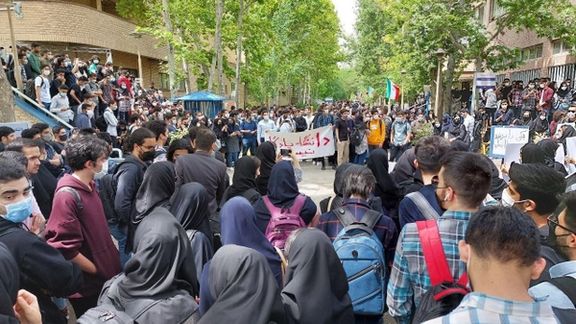
Iranian students suspended from universities issued a statement declaring December 6 as a "nationwide student strike."
The statement criticized the Islamic Republic, stating that it has “legitimized itself through autocracy and relies on coercive forces.”
The students urged their peers across Iranian universities to "refrain from attending classes for one day" as a form of protest. The announcement comes amid increasing pressure on students, with reports of summonings and suspensions related to clothing choices, stemming from last year's nationwide protests following the controversial death of Iranian-Kurd Mahsa Amini in morality police custody.
Students were at the heart of protests and were consequently harshly punished, including bans on education. The death of the 22-year-old, arrested for the inappropriate wearing of her hijab, triggered widespread civil unrest and became a focal point for student-led protests across Iran. Iranian universities have witnessed heightened tensions since last year, particularly as students view the government as a symbol of a patriarchal society that contradicts their pursuit of gender equality.
The refusal to adhere to the mandatory hijab is also seen as a manifestation of discontent with the Islamic Republic and its policies. The wave of student protests draws parallels with the political unrest of the 1960s and 70s, though during that period, the focus was on political issues rather than hijab-related concerns.
Since last September, at least a thousand protesting students have faced suspension or academic bans across various universities in Iran.
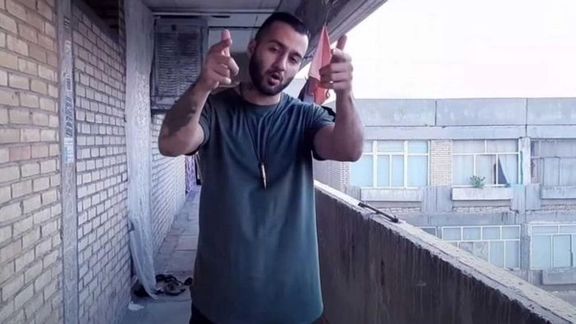
Dissident rapper Toomaj Salehi was transferred to Dastgerd Prison in Esfahan on Sunday after spending several days in undisclosed detention.
A fresh case has been initiated against him at the Revolutionary Court of Esfahan in the latest arrest just days after he was released from prison.
The 33-year-old artist was apprehended by plainclothes officers on a Babol street in northern Iran last Thursday. The arrest, reported without any judicial order, allegedly involved severe physical abuse, with officers purportedly using the butts of their AK-47 rifles and pistols.
Salehi had spent over a year behind bars, including 252 days in solitary confinement and was released on bail on November 18th. In response to his re-arrest, a trending campaign on Friday garnered over 75,000 mentions of Toomaj Salehi on the X social network, with many posts questioning his whereabouts.
Amir Raisian, Salehi's legal representative, posted on X: "Toomaj finally contacted his family today, stating that he was transferred to Dastgerd Prison yesterday afternoon."
Questions surround the authorization under which Toomaj was held from December 9 to December 12, especially considering the legal restriction on detentions exceeding one year, Raisian said.
Salehi rose to prominence for his protest songs addressing social issues and government injustices in Iran. His initial arrest in October 2022 was part of a broader crackdown on political opponents of the regime following the uprising sparked by the death in morality police custody of Mahsa Amini.